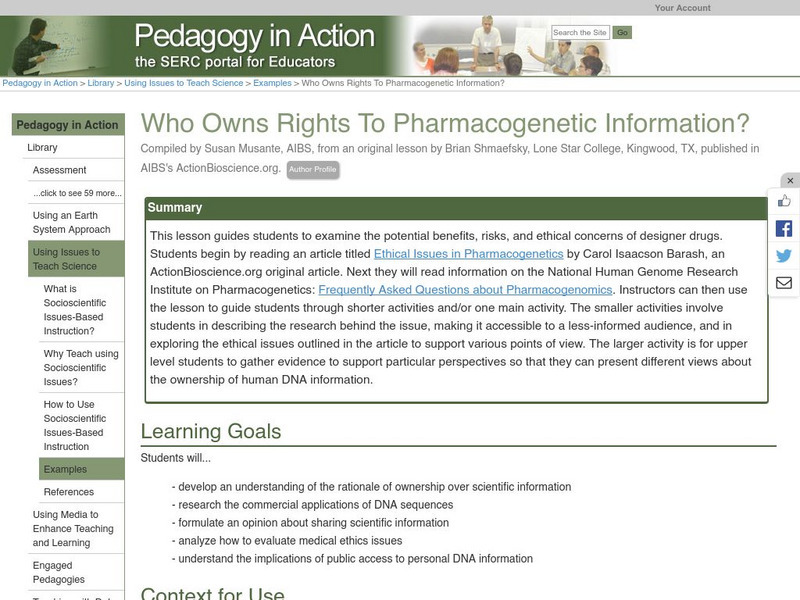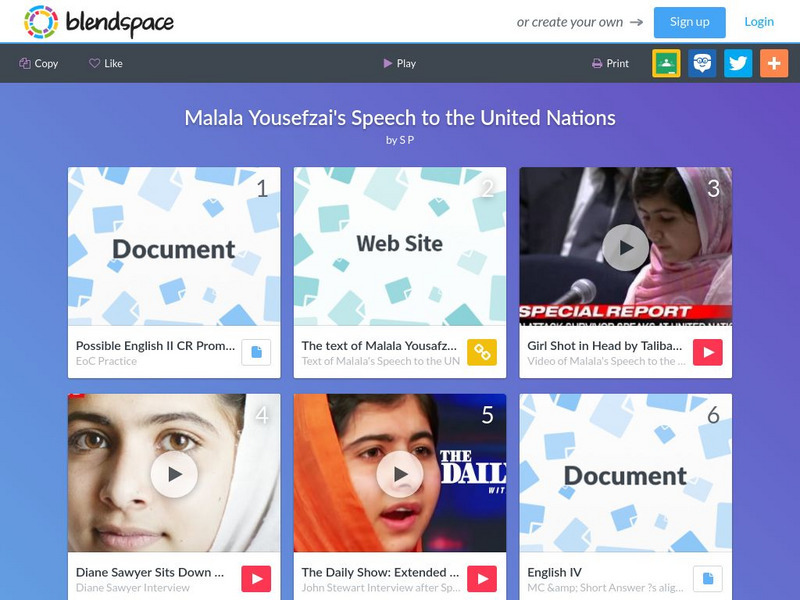Hi, what do you want to do?
PBS
Wnet: Thirteen: Human Rights (Lesson Plan)
A lesson for exploring and reporting on world human rights issues in which learners analyze the Universal Declaration of Human Rights and compare it to the U.S. bill of rights.
PBS
Pbs Learning Media: Girls Speak Out: Wide Angle: Lesson Plan
This lesson follows girls in India and Benin to evaluate their access to education, a basic human right.
PBS
Pbs Learning Media: Global Oneness Project: A Refugee's Story (Lesson Plan)
Young scholars watch a 19-minute documentary that tells the story of Mohammed Alsaleh, a young Syrian refugee granted asylum in Canada in 2014, who is now counseling newly arrived refugees. In this lesson plan, students explore through...
National Endowment for the Humanities
Neh: Edsit Ement: Civil Rights Movement
This lesson plan on the Civil Rights movement is organized into three sections: "Identifying the Need for Change," "Ordinary People in the Civil Rights Movement," and "Historic Places in the Civil Rights Movement."
Other
Cuso
CUSO is a Canadian organization similar in mission and purpose as the United States' Peace Corps. Founded in 1961, CUSO has grown into a dynamic organization working to combat poverty and inequality, aid human rights, treat HIV/AIDS, and...
Khan Academy
Khan Academy: Us History: 1945 1980: The Civil Rights Movement Expands
A quick comprehension check over the expansion of the Civil Rights Movement.
Khan Academy
Khan Academy: Us History: 1800 1848: Women's Rights and the Seneca Falls Convent
The first women's rights movement advocated equal rights for white women by leveraging abolitionist and Second Great Awakening sentiment.
Science Education Resource Center at Carleton College
Serc: Who Owns Rights to Pharmacogenetic Information?
This lesson explores ethical issues around ownership of scientific and human DNA information. Students learn about the benefits and risks of new drugs, and related ethical matters, and what the concerns are about sharing of genetic...
TED Talks
Ted: Ted Ed: The Rise of Human Computer Cooperation
Brute computing force alone can't solve the world's problems. Data mining innovator Shyam Sankar explains why solving big problems is not a question of finding the right algorithm, but rather the right symbiotic relationship between...
Khan Academy
Khan Academy: Us History: 1945 1980: Early Steps in the Civil Rights Movement
A quick comprehension check over the early steps in the Civil Rights Movement.
Khan Academy
Khan Academy: Us History: 1945 1980: African American Veterans and Civil Rights
Learn about Dorie Miller, Amzie Moore, Medgar Evers and other African American veterans who played a role in the Civil Rights Movement.
Khan Academy
Khan Academy: Us History: 1945 1980: Introduction to the Civil Rights Movement
Learn about the origins, strategies, and unfinished business of the Civil Rights Movement in the United States.
University of Virginia
U of Virginia: Bad Blood: The Tuskegee Syphilis Study
Participants in the Tuskegee Syphilis Study were never told that they had syphilis. Instead, the doctors and scientists said they had "bad blood." Find out what took place during this study, and the social and political consequences...
PBS
Pbs: An Apology 65 Years Late
An article covering former President Clinton's apology to the survivors and family members of the Tuskegee Syphilis Study. Dated May 16, 2007.
PBS
Pbs: Tolerance in Times of Trial
This lesson compares the treatment of Japanese-Americans and German-Americans during World War II and the treatment of Arab-Americans after September 11th.
Khan Academy
Khan Academy: Us History: 1945 1980: Emmett Till
Read about the brutal murder of a fourteen-year-old boy that became a rallying point for the Civil Rights Movement.
Varsity Tutors
Varsity Tutors: Web English Teacher: Alan Paton
This site features excellent links to lesson plans and activities for the book "Cry, the Beloved Country."
National Women’s History Museum
National Women's History Museum: Breaking Through Gender Roles
Students will explore the women of NASA and identify and analyze their key contributions to the field of aeronautics.
National Endowment for the Humanities
Neh: Edsit Ement: Who Were the Foremothers of Women's Equality?
Which women made significant contributions to the early Women's Rights Movement in the U.S.? In this teaching unit, students will discover the women involved in the formative years of the struggle for women's rights and the history of...
National Endowment for the Humanities
Neh: Edsit Ement: Chaucer's Wife of Bath
These lesson plans, focusing on Chaucer's Wife of Bath, encourage students to explore the roles of women and the views of marriage during the Middle Ages. Website includes several links to further related information.
PBS
Pbs: Theory of the American Founding, Part 3: Why Equal Protection of the Law?
A lesson plan that helps students examine the Declaration of Independence and other excerpted historical writings in relation to the ideas of human equality and equal protection under the law.
Khan Academy
Khan Academy: Us History: 1945 1980: Liberation Movements of the 1970s
Learn about the emergence of the American Indian Movement, the gay rights movement, and second-wave feminism.
TES Global
Blendspace: Malala Yousefzai's Speech to the United Nations
A sixteen-part learning module with links to images, texts, and videos about Malala Yousefzai and her speech to the United Nations.
Khan Academy
Khan Academy: Us History: 1945 1980: Second Wave Feminism
During the 1960s, influenced and inspired by the Civil Rights Movement, women of all ages began to fight to secure a stronger role in American society.
























